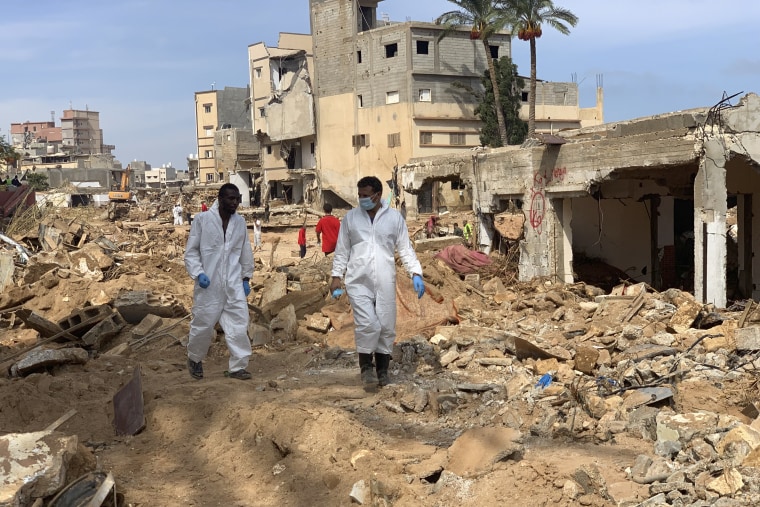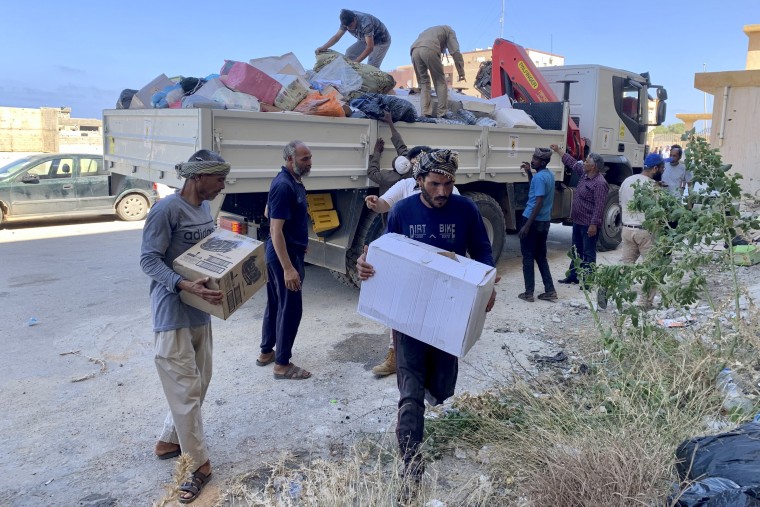The death toll from the unprecedented flooding in northeastern Libya has risen to at least 11,300 people, the U.N. has said, with 10,100 more missing in the devastated city of Derna alone.
Meanwhile, rescuers, armed with diggers, clawed through debris Sunday to find survivors under the rubble of leveled buildings in Derna, where the previously asphalt roads were awash with wreckage. Bodies are regularly being found amid mangled cars, uprooted palm trees and bits of buildings at the Derna seafront.
Residents and aid groups gathered the bodies of those who were washed out to sea when historic rain caused two dams to burst and sent millions of cubic meters of floodwater through the center of the city.
“These figures are expected to rise as search-and-rescue crews work tirelessly to find survivors,” the United Nations’ Office for Coordination of Humanitarian Affairs, said of the death toll as of 5 p.m. Saturday (11 a.m. ET).

The World Health Organization said 32 tons of health aid — enough to reach almost 250,000 people — also arrived Saturday, including essential medicines, trauma and emergency supplies, and medical equipment.
“This is a disaster of epic proportions,” Dr. Ahmed Zouiten, a WHO representative in Libya, said in a statement.
The aid package also includes body bags for safe and dignified burials of the dead amid fears of the authorities’ rushing to bury people in mass graves.
“The bodies of people who have died following wounds sustained in a natural disaster or armed conflict almost never pose a health danger to communities,” the agency said in a separate statement last week, urging for properly documented burials and cremations.
Health alarms were not limited to the dead bodies.
“The National Center for Disease Control has already detected at least 55 children poisoned as a result of drinking polluted water in Derna,” said the Office for Coordination of Humanitarian Affairs.
Nearly 300,000 children were at soaring risk of diarrhea, cholera, dehydration and malnutrition, according to UNICEF, with nearly every critical infrastructure having been wiped out in the affected areas.

“Children are among the most vulnerable and are at high risk of disease outbreaks, lack of safe drinking water, malnutrition, disruption in learning, and violence,” the agency said last week in a statement.
Entire neighborhoods were swept away last week when Storm Daniel caused two dams to collapse, unleashing on what was a struggling coastal city of 90,000 caught in years of political turmoil.
Experts have said the disaster, brought on by the deadly mix of torrential rain and poor management of the dams — or the complete lack of them — could have been prevented.
A hydrologist had begun researching the dams protecting the port city about 17 years ago, and the threat the residents faced was well-known, he said.
“When I gathered the data, I found a number of problems in the Derna valley: in the cracks present in the dams, the amount of rainfall and repeated floods,” Abdul Wanis Ashour told Reuters.
“I found also a number of reports warning of a disaster taking place in the Derna valley basin if the dams were not maintained,” he said.
The results of his study, which were published in an academic paper last year, “demonstrated that the study area has a high potential for flood risk,” calling for immediate steps to enforce regular maintenance and precautionary measures for residents.
“Therefore, dams of Wadi Derna basin is needed periodic maintenance,” he wrote in the paper.
His worst fear came true last week.
According to state media, the flooding destroyed at least 891 buildings in Derna.
The collapse of the two dams, which were built in the 1970s, will be investigated along with the local officials and previous governments, Libya’s general prosecutor said at a news conference late Friday.
Ashour said: “There were warnings before that. The state knew of this well, whether through experts in the Public Water Commission or the foreign companies that came to assess the dam.
“The Libyan government knew what was going on in the Derna River Valley and the danger of the situation for a very long time.”
